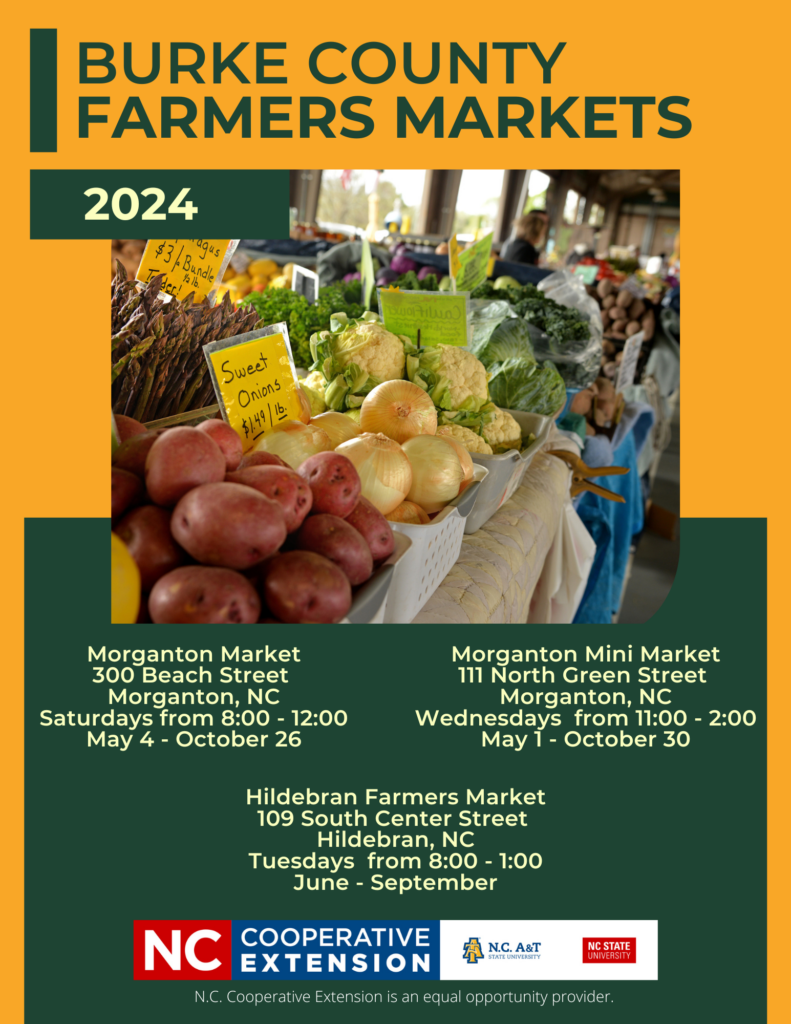Celebrating National Farmers Market Week
go.ncsu.edu/readext?1016792
en Español / em Português
El inglés es el idioma de control de esta página. En la medida en que haya algún conflicto entre la traducción al inglés y la traducción, el inglés prevalece.
Al hacer clic en el enlace de traducción se activa un servicio de traducción gratuito para convertir la página al español. Al igual que con cualquier traducción por Internet, la conversión no es sensible al contexto y puede que no traduzca el texto en su significado original. NC State Extension no garantiza la exactitud del texto traducido. Por favor, tenga en cuenta que algunas aplicaciones y/o servicios pueden no funcionar como se espera cuando se traducen.
Português
Inglês é o idioma de controle desta página. Na medida que haja algum conflito entre o texto original em Inglês e a tradução, o Inglês prevalece.
Ao clicar no link de tradução, um serviço gratuito de tradução será ativado para converter a página para o Português. Como em qualquer tradução pela internet, a conversão não é sensivel ao contexto e pode não ocorrer a tradução para o significado orginal. O serviço de Extensão da Carolina do Norte (NC State Extension) não garante a exatidão do texto traduzido. Por favor, observe que algumas funções ou serviços podem não funcionar como esperado após a tradução.
English
English is the controlling language of this page. To the extent there is any conflict between the English text and the translation, English controls.
Clicking on the translation link activates a free translation service to convert the page to Spanish. As with any Internet translation, the conversion is not context-sensitive and may not translate the text to its original meaning. NC State Extension does not guarantee the accuracy of the translated text. Please note that some applications and/or services may not function as expected when translated.
Collapse ▲National Farmers Market Week, celebrated annually during the first full week of August, shines a spotlight on the crucial role farmers markets play in communities across the nation. This event underscores the importance of supporting local farmers and the profound impact such support has on local economies.
Consumers want food that is healthy and environmentally friendly and our local farmers are meeting this need each week. Farmers that utilize farmer’s markets are minimizing the amount of waste and adopting environmentally sound farming practices that improve the natural environment while producing healthy food for consumers. These consumers purchase the sustainable produce providing money directly to the farmer in order to continue building our local food supply. Studies have shown that for every dollar spent at a farmers’ market, the producer receives around 90 cents, as opposed to 15-17 cents on the dollar when they sell to a wholesaler.
Farmers markets are more than just places to purchase fresh produce; they are vibrant hubs of economic activity. By buying local, consumers contribute directly to the financial well-being of their communities. Every dollar spent at a farmers market generates twice as much economic activity within the region, compared to money spent at a large supermarket. This phenomenon, known as the “multiplier effect,” ensures that money circulates within the local economy, fostering growth and sustainability.
Local farmers markets also create jobs and business opportunities. They provide a platform for farmers and small-scale producers to sell their goods, enabling them to earn a fair income and reinvest in their operations. Additionally, these markets encourage entrepreneurship and innovation, offering new farmers and artisans a chance to establish themselves in the market.
Supporting farmers markets reduces the environmental impact of food transportation and promotes sustainable farming practices. Consumers benefit from fresh, nutritious grown produce, enhancing community health and well-being.
By celebrating National Farmers Market Week, we recognize the pivotal role farmers markets play in nurturing robust local economies and fostering community connections. Let’s continue to support our local farmers and reap the economic benefits of purchasing locally grown produce. Be on the lookout for more restaurants and stores in our area selling local foods!





